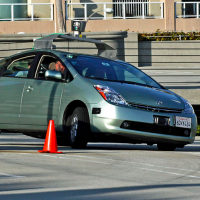NASA and Nissan Partner to Research Self-Driving Vehicles

Are self-driving cars really going to take off any time soon? They made plenty of headlines at the recent International CES in Las Vegas and at the North American International Auto Show in Detroit, but many question when, or if, this technology will ever come to pass. Would you get in a self-driving car during rush hour? In the rain? According to a Pew Research Center survey, “Americans are split on the idea of riding in a driverless car: 48% say they would, while 50% say they would not.”
Self-driving vehicles must be able to adapt to multifaceted, rapidly changing environments, whether they are transporting materials or humans. Guess what? These same concepts hold true for the autonomous vehicles that have already been deployed, such as NASA's Mars rover Curiosity and NASA's Mars rover Opportunity.
Now, NASA’s Ames Research Center at Moffett Field, California and Nissan North America’s Silicon Valley Research Center have joined forces with a five-year research and development partnership agreement. Researchers from the two organizations will work on autonomous drive systems, robotics, human-machine interface, software analysis and verification, and network-enabled applications. The first part of the agreement involves cooperative research and development of algorithms, concepts, and integrated prototypes for self-driving cars.
Testing will include an electric Nissan Leaf. As for a target date, according to the Nissan announcement the company will progressively introduce the autonomous drive technology to consumers “beginning in 2016 up to 2020." The ultimate goal is the ability to drive in city traffic.
Of course, Google also has self-driving cars on its radar. A recent Reuters article reported that Google is in discussions with “most of the world's top automakers and has assembled a team of traditional and nontraditional suppliers to speed efforts to bring self-driving cars to market by 2020.”
If self-driving cars do come to pass, that must mean that we can legally text and drive and catch up on YouTube videos, like Jimmy Fallon’s monologue on the pros and cons of having a self-driving car.

